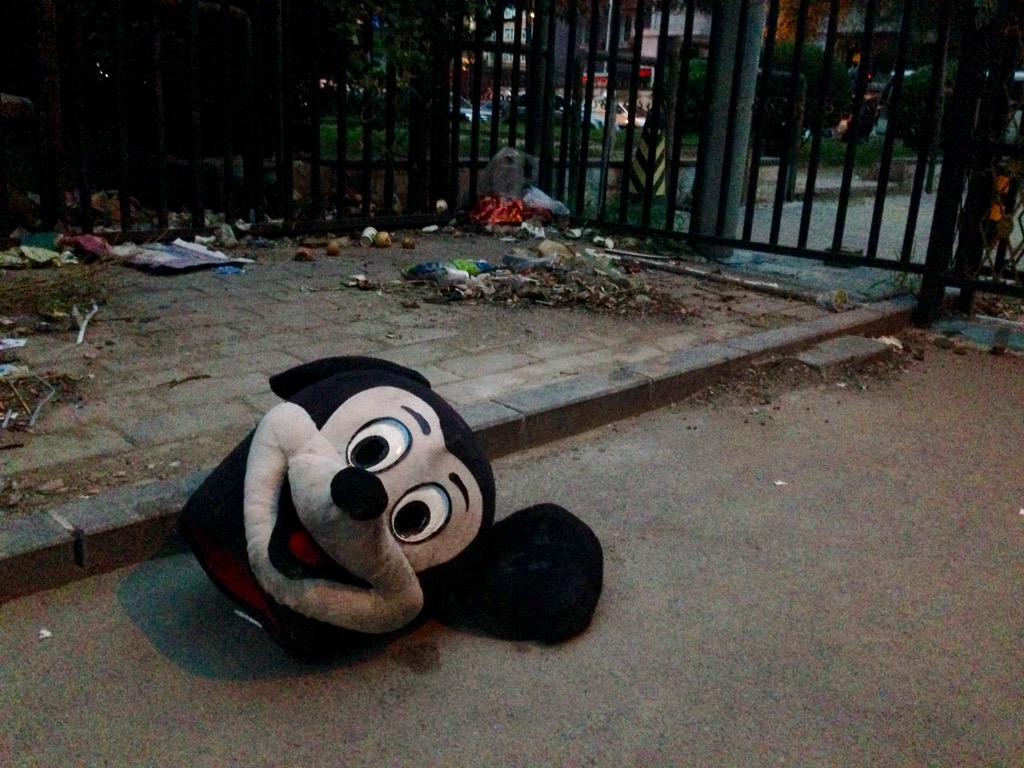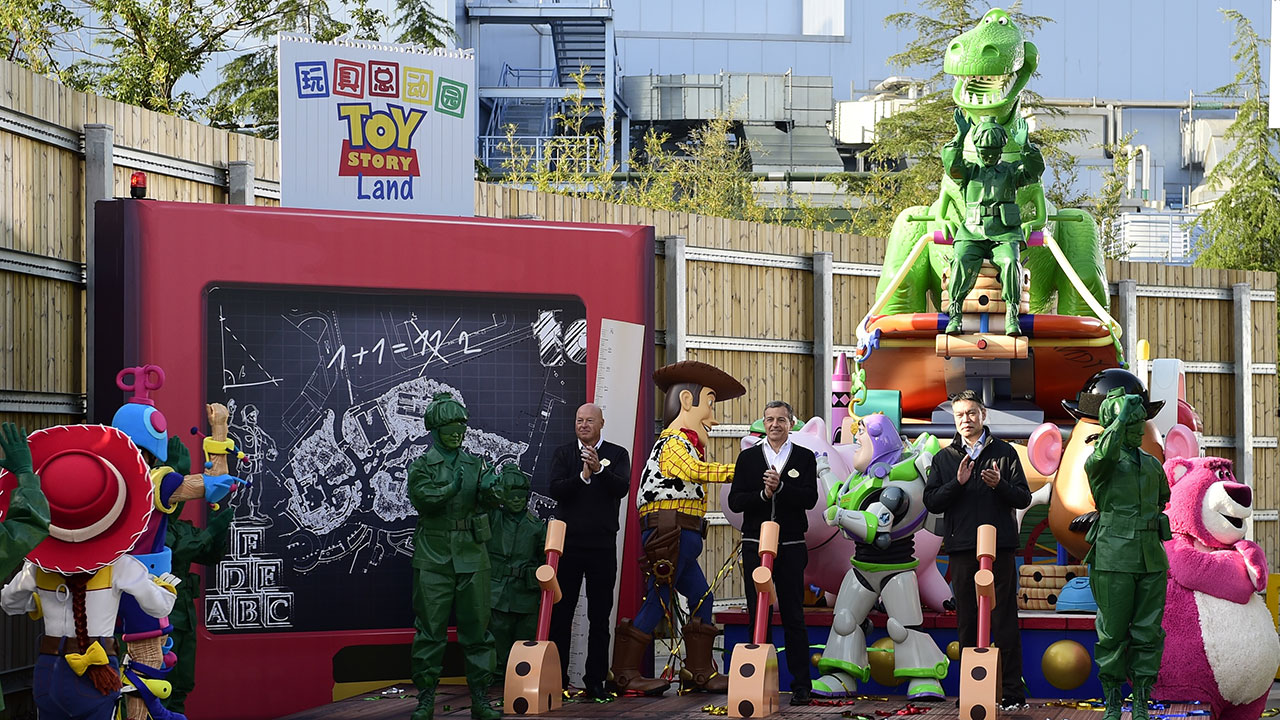Tourism dries up at Shanghai Disneyland as visitors complain of high prices and poor service on social media inside mainland China
| Before: Disneyland Shanghai entry gates crowded with visitors on opening day, June 16, 2016 |
| After: Same entry lines at the main entry gates on Dec. 3 shows business has collapsed at Shanghai Disneyland |
Clearly, the word-of-mouth about Disney's newest theme park is not good, and there's not much Disney can do to counteract the bad publicity through its own publicity and marketing machine inside mainland China.
| The outlook on Shanghai Disneyland has become significantly darker over the past month as bad word-of-mouth about the resort is spreading in China |
"I heard everything in the park was expensive," said one college student from Jiangxi Province who was visiting the park, "so I bought lunch ahead of time." She added that she did not plan on buying any souvenirs or gifts while she was inside the park.
40% of the respondents to the Nikkei survey said that poor customer service was a big issue for not coming back to the new resort. Guests frequently complained about Disney staff members doing nothing about line-jumpers, giving unclear directions or help when asked for assistance, as well as staff using course or vulgar language in their interactions with paying guests.
"There are plenty of staff around," a college student visiting from Hangzhou said, having asked two separate cast members for help in directions to no avail, "but they can't even give clear directions."
 |
| How did things go south so fast for Disney in China and Hong Kong? |
Repeat business to Shanghai Disneyland was always a major key to the theme park's long and short term financial success, but with the unexpected bad word-of-mouth from existing visitors, turning the fortunes around for the new theme park maybe a much harder task than anyone could have imagined.
Without much media support inside mainland China (e.g., no Disney Channel, TV or radio stations), dispelling the existing bad word-of-mouth about the new theme park will take a great deal of time and effort to overcome as that counter message, too, will rely on word-of-mouth to trickle down to the mass that things have finally changed.
| Many visitors are complaining on social media that food and souvenirs at Disneyland Shanghai are just too expensive |
Some Disney officials even said that the number of visitors in its first year could easily exceed the number of visitors going to the Magic Kingdom in Walt Disney World, which was a record 20.4 million visitors in 2015.
Why wouldn't anyone not expect those kinds of spectacular numbers from Shanghai? After all, China is the most populous nation in the world, so none of these kinds of numbers would be far-fetched or unexpected.
However, those kind of numbers never materialized. The estimates after the grand opening were downgraded to about 10 to 12 million visitors per year. Now it seems to Disney will have a difficult time even meeting the lowest estimate of 10 million visitors in its first year of operations.
| Disney is now in a theme park war with several Chinese theme park developers, including China's richest man, Jianlin Wang, chairman of the Dalian Wanda Group |
Shanghai Disney's fortunes have not been as rosy of late, as Disney executives have tried to portray them to be, and the underlying reason why the resort is floundering is a reason we pointed out in one of our earlier articles: Disney does not have any significant media presence or support inside mainland China to help promote the resort or to help market its products or services inside the relatively cloistered and tightly controlled media outlets inside the Middle Kingdom.
It's all an existential marketing question that needs to be asked by investors and business people alike: If a tree falls in a forest and no one around to hear it, does it make a sound?
| Problems at Hong Kong Disney compound the loss of business at Shanghai Disneyland as both parks are now cannibalizing each other's business |
It should be noted that Disney has yet to successfully open a new theme park resort outside of the United States, apart from Disneyland Toyko, which is wholly owned and operated by an outside third-party entity, the Oriental Land Company, and not owned in any part by Disney. EuroDisney (later redubbed as Disneyland Paris) and Disneyland Hong Kong had both floundered when they initially opened and have been financial failures for years before even breaking even.
Business in Disneyland Paris has dropped by more than 10% due to fears of recent and escalating terrorist attacks on high-profile, soft-targets on the European continent. That disturbing and nagging problem isn't going away anytime soon.
Having the three Disney theme parks in Asia now, all competing with one another and against a number of other new and upcoming theme parks and retail/entertainment projects in mainland China, doesn't seem to bode very well for Disney's theme park operations.
| Problems with slumping attendance numbers at Disneyland Paris round out the problems with dropping attendance at all the Disney theme parks worldwide |
It appears Disney was hiding significant financial losses in its theme park operations and other business segments from investors and Wall Street analysts by using this deceptive accounting trick.
Estimates show that attendance numbers to all Disney parks dropped at or near 10% across every Disney theme park around the world, which is just alarming.
Thus, it appears that Disney now has significant financial problems across all its Business segments—apart from the movie studios—and Disney's financial woes extend far beyond just its media networks segment as is popularly perceived, which includes significant subscription losses at its most profitable unit, ESPN.
Sources:
- EJIInsight: Japanese media unimpressed with Shanghai Disneyland (1/24/17)
- Barron's: ESPN Isn’t the Only Puzzle Facing Disney in 2017 (12/29/16)
- TheStreet: Why Walt Disney Stock Is Flat for the Year Despite Box-Office Hits (12/28/16)
- Seeking Alpha: Disney: Star Wars Is Meaningless Yet Again (12/26/16)
- Theme Park Insider: Is Shanghai Disneyland still succeeding, six months after its opening? (12/22/16)
- Nikkei Asian Review: Why Shanghai Disneyland's spell is wearing off after six months (12/22/16)
- Nikkei Asian Review: Shanghai Disney buzz turns sour over food costs, service (12/14/16)
- BNL Finance: Why Walt Disney Co (NYSE:DIS) Stock Owners Should Worry in 2017 (12/12/16)
- Disney ends fiscal 2016 on an ominously sour note (11/29/16)
- Disney in serious trouble as they miss earnings projections for the second time in the last three quarters (11/10/16)
- CNN: Is Shanghai Disney's magic wearing off already? (10/5/16), with videos
- Fortune: Disney's Massive Shanghai Park Could Already Have Attendance Problems (10/5/16)
- KTLA: Disney's New Shanghai Theme Park Falling Short of Expectations (10/5/16)
- We told you so! Disney stocks drops to its lowest point in 7 months since Aug. 9th's third-quarter earnings call (9/1/16)
- BBC: Media dismisses claims Disney has turned dismal in China. (8/11/16)
- China: Shanghai Disneyland receives complaints for closing rides (8/10/16)
- Judgment day: Quarterly earnings for Disney largely disappoint as predicted and result in a drop in Disney stock prices in after hours trading (8/09/16)
- Orlando Weekly: Nearly two months after Shanghai Disneyland opens, Disney layoffs the team that built it (8/09/16)
- LA Times: After opening Shanghai Disneyland, Disney Imagineering lays off theme park designers (8/5/16)
- OC Register: Walt Disney Imagineering reduces staff after Shanghai Disneyland opens (8/5/16)
- Bearish forecasters brace for Disney stock to tank as earnings expected to fall well short of Wall Street expectations again during Disney's next quarterly earnings call (8/03/16)
- YIBADA: For Some Chinese Visitors, Shanghai Disneyland is not a Resort but One Big Toilet Bowl (6/23/16)
- Motley Fool: Why Disneyland Shanghai Is So Important for Disney Investors (6/25/16)
- The Daily Meal: The Sky-High Prices at the Newly Opened Shanghai Disneyland Are Less Than Magical (6/21/16)
- Disney's failure to reach a deal with Beijing in establishing a significant media presence inside China may sink its hopes for success in its $5.5B 'distinctly communist' theme park (6/19/16)
- Forbes: Crowds, Prices To Challenge Shanghai Disney After Festive Opening (6/17/16)
- Shanghai Disneyland Could Lose Money for Years (6/14/16)
- NextShark: Chinese Tourists are Outraged Over the 'Unreasonable' Food Prices at Shanghai Disneyland (6/13/16)
- Barron’s: Shanghai Disneyland Could Lose Money for Years (6/13/16)
- Will This Aggressive Rival Challenge Walt Disney Co's Chinese Ambitions? (6/5/16)
- Wanda beats Disney to the punch in China by opening first Chinese-themed theme park (5/28/16)
- Exclusive! Delays in construction of Shanghai Disneyland puts monkey wrench in planned updates for new 'Soarin'' ride at DCA (5/11/15)

Comments
Post a Comment